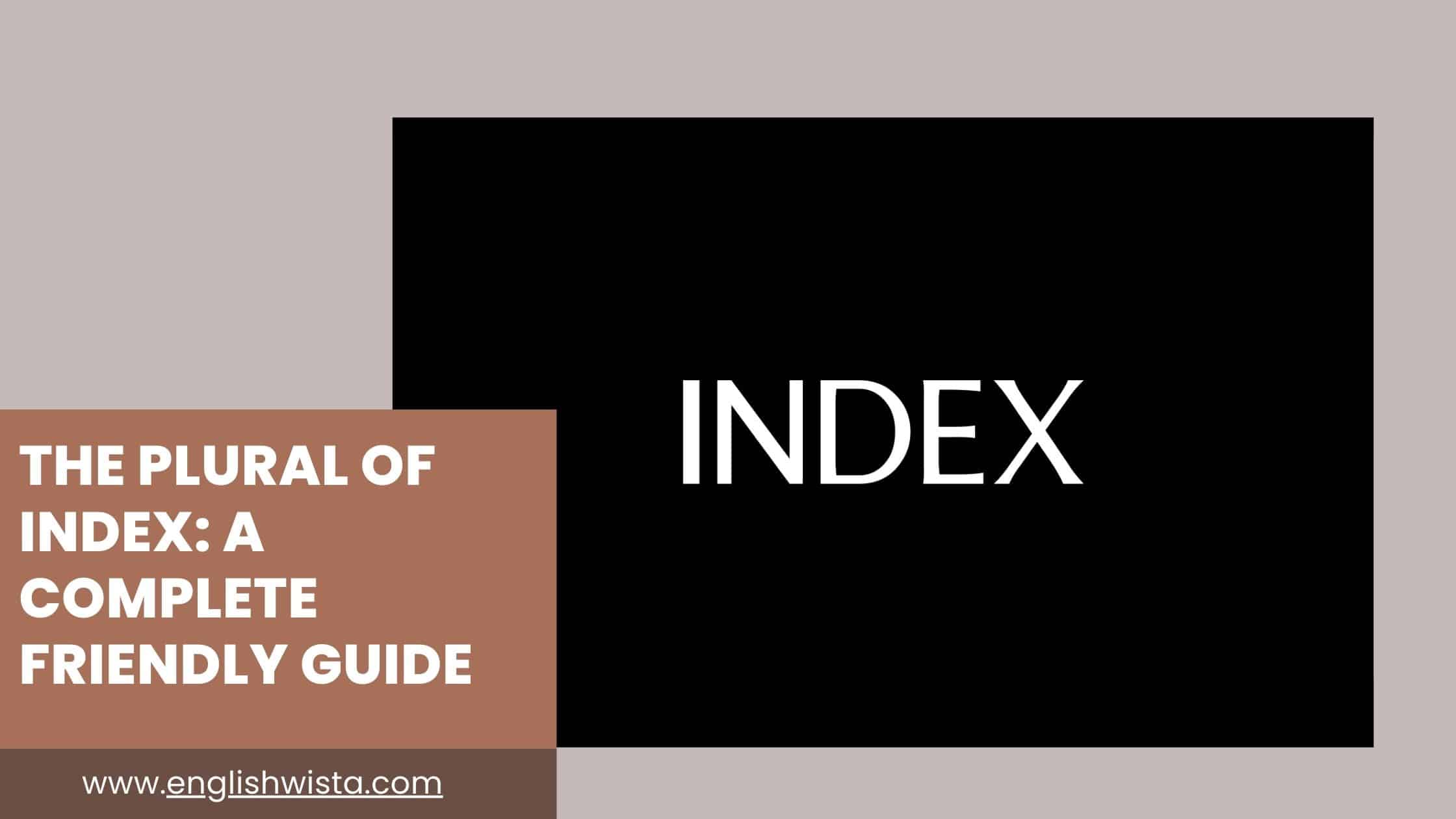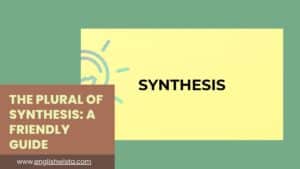Have you ever been flipping through a book, looking for a topic, and found yourself at the index in the back? Or maybe you’ve heard people talking about the stock market index when discussing finances. The word index pops up in many areas of life from libraries and books to mathematics and economics.
But what happens when you need to talk about more than one index? Do you simply add an “-es” and say indexes? Or do you use the fancy Latin form, indices?
If you’re not sure, don’t worry you’re not alone. This is one of those tricky English words that can make even native speakers stop and think. In this article, we’re going to break it all down in a friendly, simple way. By the end, you’ll not only know the plural of index, but you’ll also understand when to use indexes and when to use indices.
So grab a cup of tea or coffee, and let’s take a closer look.
What Does “Index” Mean?
Before we jump into plurals, let’s get clear on the word itself.
The word index has several meanings, depending on the context:
- In books: An index is the alphabetical list of topics, usually found at the end of a book, with page numbers to help you find information quickly.
- In economics: An index can measure prices, performance, or statistics, like the “Consumer Price Index” or a “Stock Market Index.”
- In mathematics: An index might refer to a small number written above or below another number (like in exponents or sequences).
- In everyday use: An index can also mean a sign, pointer, or indicator of something.
So, the word is quite flexible. Because of this flexibility, English has ended up with two plural forms that are both correct, but used in slightly different ways.
What Is the Plural of Index?
The big question! The plural of index can be:
- Indexes
- Indices
Yes, both are correct. But they are not always used in the same way. Let’s explore the difference.
When Do We Use “Indexes”?
The form indexes is often used in everyday English, especially when talking about books, lists, or databases.
Examples:
- “The librarian showed me two different indexes at the back of the books.”
- “Modern software allows you to search multiple indexes quickly.”
- “Some dictionaries contain special indexes for illustrations and diagrams.”
Think of it this way: if you’re talking about practical lists or collections, the safe choice is indexes.
When Do We Use “Indices”?
The form indices is the original Latin plural, and it is still used, especially in mathematics, science, and economics.
Examples:
- “Mathematicians often study the properties of several indices at once.”
- “The stock market has many indices that track different industries.”
- “The scientist compared the growth indices of different plant species.”
So, if you’re in an academic, scientific, or financial context, you’re more likely to see indices. It gives a more formal or technical feel.
A Quick Comparison
Here’s an easy way to remember the difference:
- Indexes = everyday use, books, databases, lists.
- Indices = technical use, math, science, finance.
Both are correct, but the context matters.
Is “Index” Singular or Plural?
Good question! Index is singular.
- One index = singular
- Two indexes / two indices = plural
Example:
- Singular: “The book has an index.”
- Plural: “The books have indexes.”
- Plural (math/science): “The equations have several indices.”
Why Are There Two Plural Forms?
Now you might be wondering why does English make this so confusing? Why can’t we just have one plural?
The reason lies in history.
The word index comes from Latin. In Latin, many words ending in -ex form their plural by changing to -ices. For example:
- appendix → appendices
- matrix → matrices
- index → indices
When English borrowed the word, it kept the Latin plural. But over time, English speakers also started adding the regular English plural ending -es, giving us indexes.
Instead of choosing one, English decided to keep both. That’s why today we can use either, depending on the situation.
Real-Life Example Sentences
Let’s look at how both forms appear in real life.
Indexes examples:
- “The teacher asked us to check the indexes at the back of our textbooks.”
- “Software engineers build indexes to speed up database searches.”
- “The report includes indexes for charts, graphs, and images.”
Indices examples:
- “Economists track several indices to measure inflation.”
- “The scientist analyzed growth indices across different climates.”
- “In algebra, we often work with indices when studying powers and exponents.”
Notice how indexes feels more practical and everyday, while indices feels technical and academic.
Can You Use Indexes and Indices Interchangeably?
Sometimes, yes. But often, the choice depends on the audience and subject.
- If you’re writing for a general audience, indexes is the safer option.
- If you’re writing a research paper or discussing financial markets, indices might be expected.
So while both are correct, choosing wisely can make your writing clearer and more professional.
Fun Facts About the Word “Index”
- The word index comes from the Latin verb indicare, meaning “to point out” or “to show.” That’s why an index points you to information.
- Your index finger is named that because it’s the finger we often use to point!
- In medieval times, scholars created “indexes” of knowledge long before printed books existed. They were like early databases.
- In computing, an index is crucial for organizing data, allowing faster searches.
Related Words With Two Plurals
Index is not alone! There are several English words with both a Latin plural and a regular English plural. For example:
- Appendix → appendixes / appendices
- Matrix → matrixes / matrices
- Vertex → vertexes / vertices
These words work just like index, with one form sounding more everyday and the other more technical.
Common Mistakes to Avoid
- Using “index’s” instead of plural
- Wrong: “The book has many index’s.”
- Correct: “The book has many indexes.”
- Overthinking the choice
- Remember: both indexes and indices are correct. Don’t stress too much use the one that fits the situation.
- Forgetting that index is singular
- Wrong: “The book have an index.”
- Correct: “The book has an index.”
Practical Tips to Remember
- Everyday use → indexes
- Technical/scientific use → indices
- Don’t mix them in the same sentence unless you’re deliberately comparing contexts.
Think of it like having two pairs of shoes: both fit, but you choose the one that matches the occasion.
Quick Review
Let’s summarize what we’ve learned:
- Index is singular.
- The plural can be indexes (everyday) or indices (technical).
- Both are correct, but context matters.
- The difference comes from English keeping both the Latin plural and the regular English plural.
- Use indexes for books, lists, and databases.
- Use indices for math, science, and finance.
Conclusion
So, what’s the plural of index? Easy it can be either indexes or indices. Both are correct, and both are useful. The trick is knowing when to use each one.
If you’re talking about everyday things like books or lists, stick with indexes. If you’re diving into the world of mathematics, science, or economics, then indices is your go-to.
English can be a little messy sometimes, but that’s part of its charm. Instead of stressing, think of it as having options. You now know both, and you can confidently use the right one depending on the situation.
So the next time someone asks, “What’s the plural of index?” you’ll have the perfect answer ready. And maybe, just maybe, you’ll surprise them with a fun fact or two about Latin roots and pointing fingers!



